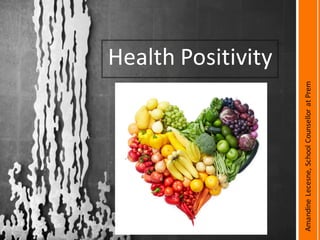Parent nutrition workshop
- 3. SELF-REFLECTION QUIZ For your eyes only! Where did you learn about what to eat and what not to eat when you were young? E.g parents, school, religion Name 3 things you like about your body Name 2 things you don’t like about your body Circle how many times you have dieted. 0-1 2-5 6-10 11+ Do you worry about what your child eats? yes/no Do you count the calories in your food? yes/no How would you help your child if they started eating too much or too little?
- 9. Brain power!
- 18. Support, but don’t police Restricting food or putting certain foods “off-limits” for the purpose of weight loss is not a good idea. Support your teen by making healthy food options readily available and modeling healthy eating behaviors. If they eat healthily when they’re at home and occasionally eat unhealthily when they are with friends, it’s not a big deal.
- 22. Exercise for FUN Not everyone wants to go running, play tennis, go to the gym, or get involved with football. However, there are lots of alternatives: Try jumping on the trampoline, dancing, jump-rope, yoga, boxing, biking, badminton, gardening, etc. The only exercise your children will do long-term is the one they enjoy doing.
- 23. Give rewards besides food All too often, we reward good grades, eating nutritious foods, birthdays, etc. with unhealty foods. Move away from rewarding or “comforting” with food. Offer books, coloring books, movie nights, a new bike/trampoline/boxing gloves, etc… as rewards instead.
- 28. We need fats to: 1. help our thinking 2. build healthy hair 3. create healthy skin 4. support mental health 5. feel satiated
- 29. Focus on health, not weight When talking to children, there’s a big difference between healthy and harmful conversations. Research suggests it’s essential that parents make health the focus- not weight or appearance. Parents should also be aware of the way they talk about their own bodies and appearance. Instead, focus on health, health improvements, and the positives that come from adopting those- like more energy, increased strength or stamina, better sleep, or meeting a physical activity goal.
- 35. If you are concerned about your child’s weight …. do NOT bring it up to them Why: bringing up a teen’s weight or a perceived need to lose weight is often interpreted as something is “wrong” with them and the suggestion of dieting by a parent appears to have no positive impact on weight loss. In fact, some studies correlate it with weight gain. Furthermore, conversations between parents and teens that focused on weight or appearance (instead of healthy eating habits) were associated with a greater risk of the teen developing unhealthy eating habits.
- 38. Calorie Talk “This is rich”, “this is fattening”, ”that has xxx calories”, etc… is triggering to teens who are already obsessing over their food. Foods should be considered for their nutrition, not just their calories.
- 40. Tell them that models, actors, K-pop artists, facebook pictures, etc… are fake/tweaked/altered/unhealthy ideals Too often, we compare ourselves to others. Nowadays, kids are being bombarded by photos of others who are trying to “look good”, by messages from companies trying to sell them the message that they are defective but that this can be fixed at a price, etc. It’s overwhelming. Because our own happiness has a lot to do with how we think we compare to others, evaluating ourselves with images which aren’t even real sets us up for failure. And our children don’t naturally have the perspective to know that they are being set up to feel less than. Not buying into the fantasy, the lure, etc… will help our children gain some perspective.
- 42. Offer genuine validation that is non-weight focused “I love you” “You worked hard on that, and I’m proud of you” “You are so kind/curious/understanding, etc” ”Let’s go for a walk together. I want to spend some time with you.” “I overheard your dad talking to family and saying how proud he is about how caring you are as an older sister” “You looked like you had a great time singing on stage. It was fun watching you!” “I’m noticing that you’re making healthy decisions for yourself these days, and it’s really great to see” “It’s great self-care for you to be going to speak to the counsellor/getting a massage/doing yoga, etc. Is there anything else you’d like to try that I can support you with?”
- 43. What to do if you notice or they tell you they have developed disordered eating patterns If you overhear them purging or you know they’re lying to you when they say they’ve already eaten, my first recommendation would be not to address the issue right then and there. You need time to think about what you’re going to say and it’s best to have this type of conversation when both of you are feeling more calm, neutral, and non-judgmental. Set a private time and place to talk. Choose to have these conversations away from the dinner table. Use “I” statements to state what you’ve observed: “I’m not upset with you, but I care about you and I’d like to know what’s bothering you. I overheard you purging. I know that purging can be a sign of stress. Are there things that have been upsetting or stressful for you?” or “I have noticed that you aren’t eating dinner with us anymore. Is dinner time a stressful time?”
